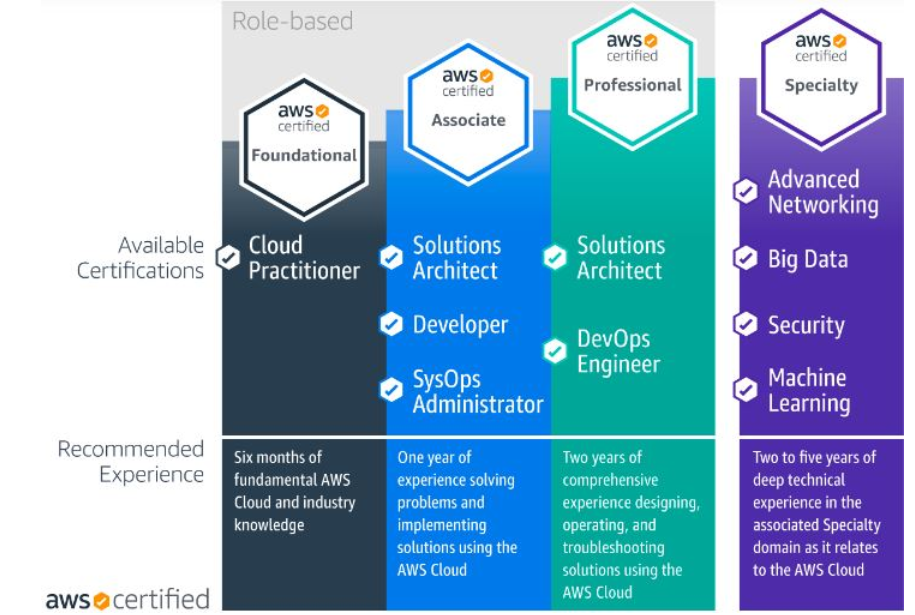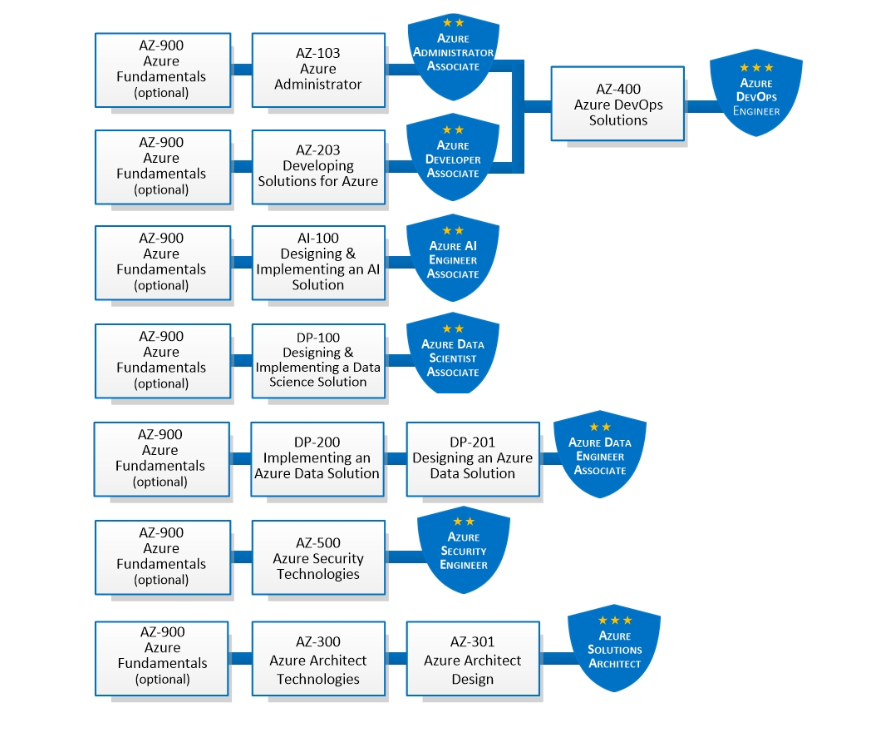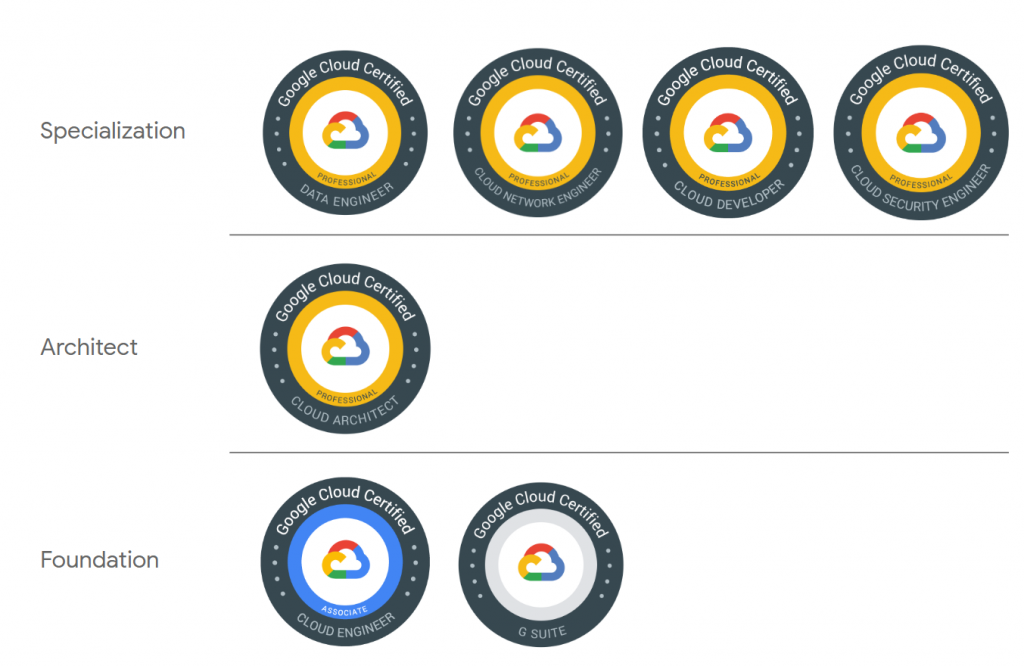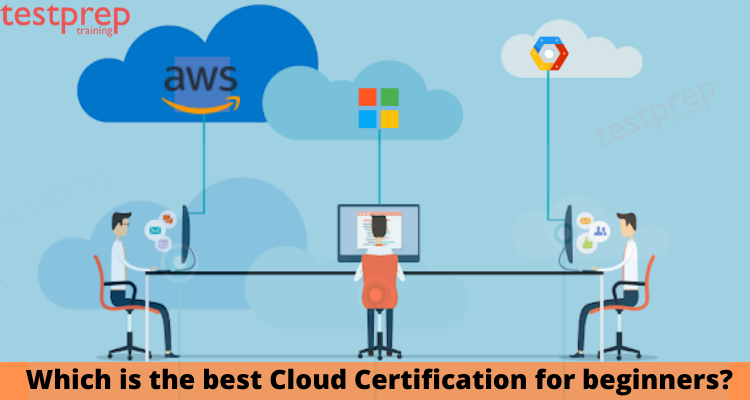If you’re just starting out in the world of cloud computing, you might be wondering which certification is the best one to pursue. With so many options available, it can be overwhelming to choose the right one for your career goals.
In this article, we’ll check out great cloud certifications for beginners and what you can learn from each. We’ll talk about famous certifications from big cloud companies like Amazon Web Services (AWS), Microsoft Azure, and Google Cloud Platform (GCP).
Whether you’re in college or changing careers, getting a cloud certification can make you look impressive when jobs are hard to get, and show that you’re really good at cloud stuff. Let’s dive into some top cloud certifications for beginners and see how they can help you start a career in the cloud.

Cloud Certification for beginners
If you’re a beginner in the cloud computing industry, there are several cloud certifications you can pursue to get started. Here are some of the best cloud certifications for beginners:
- AWS Certified Cloud Practitioner: This certification from Amazon Web Services (AWS) is designed for individuals who have a basic understanding of the AWS cloud platform. It teaches you the basic ideas about cloud and AWS things, like how much they cost and what kind of help you can get.
- Microsoft Certified Azure Fundamentals: This certification from Microsoft is designed for individuals who are new to the Azure cloud platform. It covers the basics of cloud computing, Azure services, pricing, and support.
- Google Certified Associate Cloud Engineer: This certification from Google Cloud Platform (GCP) is designed for individuals who have a basic understanding of the GCP cloud platform. It covers the concepts of cloud computing, GCP services, and how to deploy and manage applications on GCP.
- CompTIA Cloud+ Certification: This certification is vendor-neutral and covers the fundamentals of cloud computing, including cloud infrastructure, security, and maintenance.
- Certified Cloud Technology Professional (CCTP): This certification from the Cloud Credential Council is designed for individuals who want to learn about cloud computing and its impact on business operations.
These certifications can help you get started in the cloud computing industry and provide you with the knowledge and skills necessary to work with cloud-based technologies. It is important to choose a certification that aligns with your career goals and interests.
Top Certification Vendors 2023
The Cloud computing industry is dramatically increasing globally by delivering benefits to many leading organizations and corporations. It also aids in increasing efficiency and simplifying the many complicated activities and processes found in the IT industry. As a result, the importance of cloud computing has increased globally even at the start of the year 2023. However, this includes the top providers such as AWS, Microsoft Azure, and Google Cloud Platform. So, next will understand these top cloud vendors before moving on to the certifications to get better clarity.
1. Amazon Web Services (AWS)
Nowadays, Organizations are searching for individuals with good cloud knowledge and skills that will help in transforming their businesses. No matter if you’re just starting or want to get better at IT, AWS Certification can make you good at using the cloud. It checks what you know about the cloud to help you know what skills companies want. It helps people and groups do well with AWS. They have tests for different roles and skills to help people and groups reach their goals. Let’s talk about the good things AWS brings to understand it better.
Advantages of AWS:
- Firstly, mostly everything in the technology sector is linked to cloud computing. Similarly, AWS provides everything from hosting a small website to running a full data center.
- Secondly, AWS certification will work as proof that you have advanced skills to accept complex challenges related to AWS.
- Thirdly, having an AWS certification on your resume will provide a positive impact to the employer to whom you are applying for a job. Likewise, certified candidates are given more value than non-certified ones.
- Fourthly, AWS is globally recognized as the top certification in terms of salary. With having AWS certification you can boost your pay.
- Lastly, organizations with AWS certified professionals get access to become members of AWS Partner Network (APN), which provides various benefits like a concession on training, AWS usage support and many more.
2. Google Cloud Certification
GCP examines your skills and ability to transform businesses with Google Cloud technology. However, Google Cloud Platform refers to the collection of cloud computing services that runs on the same infrastructure of Google’s products such as Google search engine, YouTube, etc. Moreover, GCP provides various tools and services that help in managing infrastructures, provisioning servers and configuring networks. It also offers a variety of cloud services, such as computing, application development, machine learning, data analytics, and data storage. Developers, cloud administrators, and other IT professionals can access it over public or dedicated networks.
Now, let’s understand why one should for the GCP certifications.
Advantages of GCP:
- Firstly, GCP is scalable as it provides extreme ease in up and downscaling.
- Secondly, Google provides GCP services at a very good price in the market, as compared to its competitors. This includes four major key factors like sub-hour billing, sustained use discount, custom machine type, and preemptible instances.
- Thirdly, it provides integrated Services. In this, you can use various APIs, AI and ML, IoT, Compute engine, Databases, Big Data analytics, Developer tools, Security, Storage simultaneously.
- Lastly, GCP provides quick collaboration for all users. Therefore, multiple users can access and edit the projects at the same time.
3. Microsoft Azure certification exams
Microsoft tests help you prove you’re good at things. Likewise, getting certified in Microsoft Azure can make it more likely for someone to get a job in cloud computing. Furthermore, obtaining a Microsoft Azure certification is an excellent approach to begin your cloud career. This will assist you in gaining the skills and knowledge that will make you marketable. It will also assist in obtaining high-income pay in the sector by providing several opportunities to explore. Let’s have a look at the benefits of Microsoft Azure Certifications in more detail.
Advantages of Microsoft Azure Certification:
- Firstly, cloud computing is expected to become a $300 billion business by 2021 globally. Azure provides data that is useful to enhance skills and knowledge in the cloud.
- Secondly, Azure has maintained a good position in the industry amongst its competitors. Thus, individuals are showing interest in Microsoft Azure at a large quantity.
- Thirdly, Cloud technologies like Azure are evolving at a rapid rate, outpacing the average rate of growth in the IT sector as a whole.
- Fourthly, Microsoft Azure is easy to adapt and learn. You will deal with important concepts like Azure Automation and Operational Insights that are quite easy to learn if you have an understanding of Microsoft’s tools.
- Lastly, Microsoft Azure is designed to handle the traditional tasks of designing, deploying, and managing platforms.
We’ve arrived at the most crucial portion of this article: the greatest certifications for novices. The certifications you can apply for to gain a head start in the world of cloud computing are detailed below. You will also receive information such as the essential experience and skills, as well as a course outline for your preparation. So, let’s get started.
Top Cloud Certifications: Beginner Level
It can be tough to select which certification to pursue, so we’ve compiled a list of the best beginner-level certificates to assist you. First, we’ll discuss AWS Cloud Certification, which is a popular certification.
1. AWS Cloud Practitioner
The AWS Certified Cloud Practitioner (CLF-C02) test is for people who know the basics of Amazon Web Services. They should understand different services and how they’re used a lot. Also, they should know about AWS Cloud money stuff, like how costs work and how to look at them. However, AWS Cloud Practitioner is a pathway towards achieving Associate-level and furthermore advanced-level certifications.

Abilities Validation for the Certification:
- Firstly, defining the basis of AWS and the global infrastructure
- Secondly, describing basic AWS architectural principles, value proposition, and key services on the AWS platform.
- Thirdly, describing the basic security and compliance aspects of the AWS platform with a shared security model.
- Fourthly, defining the billing, account management, and pricing models including identifying sources of documentation or technical assistance.
- Lastly, describing the basic/core characteristics of deploying and operating in the AWS.
Knowledge and Experience
- Firstly, it is recommended for the candidates to have at least six months of experience with the AWS in any role including technical, managerial, sales, purchasing, or financial.
- Secondly, candidates should have a basic understanding of IT services and their uses in the AWS platform.
Coming to the exam details and course outline.
Exam Details
- Firstly, the exam code for the AWS Cloud Practitioner Exam is CLF-C02.
- Secondly, the exam duration will be of 90 Minutes.
- Thirdly, there will be 65 questions in the exam
- The exam will be available in English, Japanese, Korean, and Simplified Chinese language.
- Fourthly, the exam validity is 3 years.
- Lastly, the Passing score for the exam is 65-75% and the cost is $100 USD.
AWS Cloud Practitioner: Glossary
Here are some key terms and concepts that you may encounter in the AWS Certified Cloud Practitioner exam:
- AWS: Amazon Web Services, a cloud computing platform provided by Amazon.
- Cloud Computing: The delivery of on-demand computing resources over the internet.
- Infrastructure as a Service (IaaS): Cloud computing service where you get things like computers, storage, and networks that aren’t real but work just like they are.
- Platform as a Service (PaaS): Cloud computing has another kind of service where you can build, put out, and take care of programs.
- Software as a Service (SaaS): Cloud computing service to get software programs online.
- Elasticity: The ability to scale computing resources up or down as needed.
- Scalability: The ability of a system to handle increased workload or traffic without affecting performance.
- Availability: When a system can keep working and people can use it.
- Security: The measures taken to protect computing resources and data from unauthorized access.
- Region: A geographic location where AWS has data centers.
- Availability Zone: A distinct location within a region that contains one or more data centers.
- Virtual Private Cloud (VPC): A virtual network in the AWS cloud that allows users to control their own networking environment.
- Elastic Compute Cloud (EC2): A web service that provides resizable compute capacity in the cloud.
- Simple Storage Service (S3): A web service that provides scalable object storage in the cloud.
- Relational Database Service (RDS): A web service that provides managed relational databases in the cloud.
- Lambda: A service that doesn’t need servers and runs code when things happen, while also handling the computer stuff automatically.
- CloudFormation: A service that allows users to define and provision AWS infrastructure as code.
- Billing and Cost Management: A service that allows users to manage their AWS billing and costs.
Course Outline
Cloud Concepts
- In this, you will learn about defining the AWS Cloud and its value proposition.
- Secondly, you will learn to identify the aspects of AWS Cloud economics by listing the different cloud architecture design principles.
Security and Compliance
- In this, you will learn about defining the AWS shared responsibility model and AWS Cloud security concepts.
- Secondly, you will learn about identifying AWS access management capabilities.
- Thirdly, identifying the resources for security support
Technology
- In this section, you will learn how to define the methods of deploying and operating in the AWS Cloud.
- Secondly, you will learn about defining the AWS global infrastructure.
- Thirdly, you will learn to identify the core AWS services and resources for technical support.
Billing and Pricing
- This will show you how to tell apart the different ways AWS charges you.
- Then, you’ll understand how different types of accounts work with AWS money stuff.
- Lastly, you’ll figure out where to get help with paying for AWS stuff.
Coming on to the next important certification exam which is AZ-900.
2. Microsoft Azure Fundamentals Exam AZ-900
The AZ-900 exam is for people who want to show they know the basics of cloud services and using them with Microsoft Azure. But, it’s a basic test meant for people with or without tech skills, who want to check their basic knowledge. This exam is the starting point to learn about cloud services and how Microsoft Azure explains those ideas.

Exam Details
- Firstly the exam name is Microsoft Azure Fundamentals better known as AZ-900.
- Secondly, you will get 85 mins to complete the exam.
- In this exam, you will get 40-60 Questions.
- The exam is available in the English language.
- Lastly, the passing score is 700 (on a scale of 1-1000) and this exam will cost you $99 USD.
Microsoft Azure Fundamentals Exam AZ-900 Glossary
Here are some key terms and concepts that you may encounter in the Microsoft Azure Fundamentals Exam AZ-900:
- Microsoft Azure: A cloud computing platform provided by Microsoft.
- Cloud Computing: The delivery of on-demand computing resources over the internet.
- Infrastructure as a Service (IaaS): A cloud computing service model that provides virtualized computing resources such as servers, storage, and networking.
- Platform as a Service (PaaS): A cloud computing service model that provides a platform for developing, deploying, and managing applications.
- Software as a Service (SaaS): A cloud computing service model that provides software applications over the internet.
- Elasticity: The ability to scale computing resources up or down as needed.
- Scalability: The ability of a system to handle increased workload or traffic without affecting performance.
- Availability: How well a system keeps working and people can use it.
- Security: The ways we keep computers and data safe from people who shouldn’t have access.
- Region: A place on Earth where Microsoft Azure has big computer centers.
- Availability Zone: A specific spot in a region that has one or more computer centers.
- Virtual Network (VNet): A pretend network in Microsoft Azure that lets you control how things connect.
- Virtual Machine (VM): A fake computer you can use in Microsoft Azure.
- Azure App Service: A tool that helps you make, put out, and grow web apps and APIs.
- Azure Functions: A special service that runs code when stuff happens and takes care of the computer things.
- Azure SQL Database: A managed database in Microsoft Azure for holding organized information.
- Azure Cosmos DB: A big database in Microsoft Azure that’s all over the world and can hold different types of information.
- Azure DevOps: A bunch of tools to help make, put out, and manage apps from beginning to end.
Course Outline
- Describe cloud concepts (25–30%)
- Describe Azure architecture and services (35–40%)
- Describe Azure management and governance (30–35%)
For complete study guide: AZ-900 Exam tutorial
Important Note: The content of the AZ-900 exam is updated on July 31, 2023.
Let’s proceed further and talk about the next certification that is GCP Cloud Engineer.
3. GCP Associate Cloud Engineer
GCP Associate Cloud Engineers are in charge of deploying apps, monitoring operations and managing enterprise solutions. Individuals can also do typical platform-based tasks using the Google Cloud Console and the command-line interface. As a result, in order to maintain one or more deployed solutions on Google Cloud that use Google-managed or self-managed services. A qualification in your credentials can also help you gain credibility as a Google associate cloud engineer. Most crucially, self-managed or Google-managed services on Google Cloud can be used to cope with problems.
Intended Audience
- Firstly, candidates working in the IT industry.
- Secondly, individuals in the role of Data architects, Developers, and Data Engineers.
- Then, any individual accountable for managing Google cloud operations.

Exam Details
- Firstly, for the GCP exam, you get two hours to complete the exam.
- Secondly, there will be multiple choice and multiple select types of questions in the exam.
- The exam is available in English, Japanese, Spanish, Portuguese, French, German, and Indonesian language.
- This exam will cost you $125 (plus tax where applicable).
- Most importantly, for this exam, it is recommended to have at least six months of hands-on experience with Google Cloud.
GCP Associate Cloud Engineer Glossary
Here are some key terms and concepts that you may encounter in the Google Cloud Engineer certification exam:
- Google Cloud Platform (GCP): A cloud computing platform provided by Google.
- Cloud Computing: The delivery of on-demand computing resources over the internet.
- Infrastructure as a Service (IaaS): A cloud computing service model that provides virtualized computing resources such as servers, storage, and networking.
- Platform as a Service (PaaS): A cloud computing service model that provides a platform for developing, deploying, and managing applications.
- Software as a Service (SaaS): A cloud computing service model that provides software applications over the internet.
- Elasticity: The ability to scale computing resources up or down as needed.
- Scalability: The ability of a system to handle increased workload or traffic without affecting performance.
- Availability: How well a system can keep working and let people use it.
- Security: Steps taken to keep computers and data safe from people who shouldn’t get in.
- Region: A place on Earth where GCP has big computer centers.
- Availability Zone: A special spot in a region that has one or more computer centers.
- Virtual Private Cloud (VPC): A fake network in the GCP cloud that lets you decide how things connect.
- Compute Engine: A tool in the GCP cloud to use virtual computers.
- Kubernetes Engine: A managed service for running apps inside boxes on the GCP cloud.
- App Engine: A tool in the GCP cloud to help you make and put out web apps.
- Cloud Storage: A way to store lots of stuff on the GCP cloud.
- Cloud SQL: A managed database tool in the GCP cloud.
- BigQuery: A big, managed place to hold data for analyzing in the GCP cloud.
Course Outline
Setting up a cloud solution environment
- Firstly, you will learn about setting up projects and accounts.
- Secondly, it will help you to understand about managing billing configuration.
- Lastly, it will help you learn about installing and configuring the command-line interface (CLI)
Planning and configuring a cloud solution
- This section includes topics like planning and estimating GCP product use using the Pricing Calculator.
- Moreover, you will learn about planning and configuring the computing resources and data storage options
- Lastly, planning and configuring network resources.
Deploying and implementing a cloud solution
- In this, you will learn about how to deploy and implement the compute engine resources.
- Secondly, the deployment and implementation of Google Kubernetes Engine resources
- Thirdly, deploying and implementing App Engine and Functions resources
- Subsequently, deploying and implementing data solutions
- Then, deploying and implementing networking resources
Ensuring successful operation of a cloud solution
- In this section, you will deal with topics like, managing Compute Engine resources and managing Google Kubernetes Engine resources.
- Secondly, you will learn about managing the App Engine and Run resources.
- Then, the process of managing storage and database solutions.
- Lastly, it will provide you detail about managing networking resources with monitoring and logging.
Configuring access and security
- Firstly, you will learn how to manage identity and access management (IAM).
- Secondly, you will learn about managing service accounts.
- Lastly, it will explain to you how to view the audit logs for the project and managed services.
Expert Corner
Passing certification exams demonstrate to employers that you have the necessary abilities and knowledge for the job and are prepared to go above and beyond. Furthermore, they assist you in demonstrating that you have the necessary core knowledge to operate in any application. However, in order to obtain that position, you must work hard and earn the necessary credentials. That is to say, make up your choice and begin your cloud computing career by completing any of the certifications listed in the article based on your level of understanding. This will not only assist you in obtaining a solid career, but it will also ensure that your future is bright.
Learn and enhance your Cloud skills. Become a Certified Cloud Computing Professional Now!

